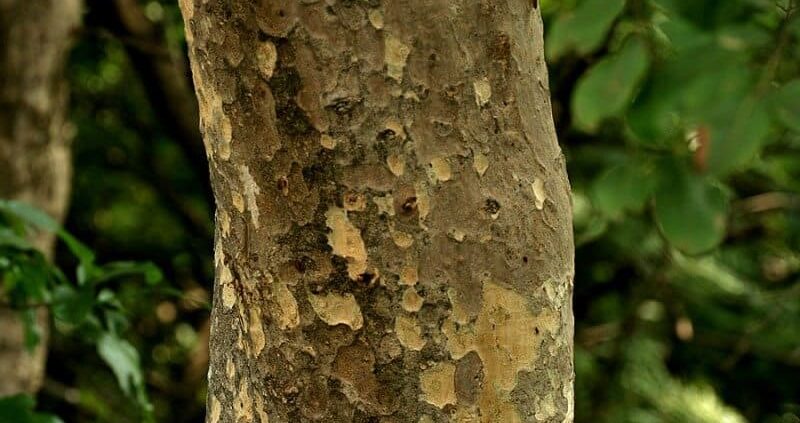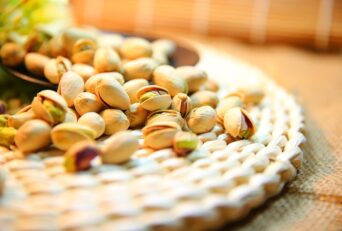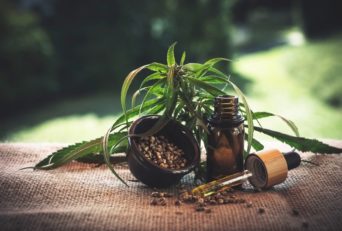Terminalia arjuna is the scientific name of arjuna herb.It is a well-known medicinal herb in the Ayurveda.It has been effectively used to treat problems related to heart diseases.
Table of Contents
What Is The Arjuna Herb?
Arjuna is a genus of large trees of the flowering plant family Combretaceae.
Comprising around 100 species distributed in tropical regions of the world. This genus gets its name from Latin terminus, referring to the fact that the leaves appear at the very tips of the shoots.
Trees of this genus are known especially as a source of secondary metabolites, e.g. Cyclic triterpenes and their derivatives, flavonoids , tannins , and other aromatics .
The Arjuna tree up to 25 meters in height and its bark is gray in color, smooth. The leaves are sub-opposite with dimensions of 5–14 × 2–4.5 cm. And its shape is oblong or elliptic-oblong. It is glabrous and often inequilateral aligned.
The leaves margin is often crenulated and the apex is obtuse or subacute. The base of the leaf is rounded or sometimes chordate and petioles 0.5–1.2cm.. It contains glands which are usually two in number. Flowers are small and white in color.
Fruits are 2.3–3.5 cm long. They are fibrous woody in nature and glabrous with 5 hard wings. They are striated with numerous curved veins. The plants flowering time is in between April and July in tropical temperature conditions. Seeds are hard and they germinate within 50–76 days.
Terminaliaarjuna is a deciduous tree and is abundantly found in India, Ceylon, Myanmar, and Sri Lanka.
Arjuna is one of the sacred trees of India. It has acquired the social and religious sanctity with the passage of time. It is said that arjuna has been born of the two sons of kubair after saint Narada cursed him.
The leaves and flowers of this tree are offered to lord Vishnu and lord Ganpati on the several religious occasions.
Names And Species of Arjuna Herb
It has several names such as-
- Koha
- Kahu
- Arjan
- White marudah
- White murdh
- Arjunamyrobalan
- Orjun,yerramaddi
- Sadada
- Sadaru, etc.
Some Other Species Of Arjuna Are
- Terminaliachebula
- Terminaliabellrica and
- Terminalia ciliate
These species are found in India.
Properties Of The Arjuna Herb
- Colour: Dark brown to dark grey.
- Odor: Characteristic
- Taste: Bitter
Medicinal Properties
1. Cardio-Protective
It has a positive inotropic and hypotensive effect. It increases vascular blood flow and protects the layers of heart from ischemic damage.
2. Anti-Oxidant
It is rich in antioxidants.
3. Antihypertensive
It has mild diuretic properties and reduces clot formation, thus helping in reducing hypertension.
Composition Of The Arjuna Herb
Arjuna bark shows a tremendous amount of uses because of the variety of chemical constituents it is composed of. They are-
- Triterpenoids: Arjunic acid and arjun oleic acid. Arjunic acid also has bioactive metabolites.
- Argenin and Arjunetin: Arjugenin is an aglycone similar to arjunic acid and arjunolic acid.
- Arjunasides a-e: Which are a triterpenoidmonoglycosides and arjunetoside.
- Ajunglycosides iv and v.
- Arjunaphthanoloside: Which is a napthanol glycoside.
- Termiarjunoside I and ii: Which is oleanane glycosides. They contain terminoside a and terminolitin.
- Pelargonidin: Which is an anthocyanin.
- Cardenolide 16,17-dihydroneridienone 3-o-beta-d-glucopyranosyl-(1->6)-o-beta-d-galactopyranoside.
- Ursane.
- Tannin mainly Gallic acid, Gllagic acid, and Epicatechin.
- Luteolin, Quercetin, Kaempferol, and Baicalein.
- Vitamin C:Standard value 1.47mg/100g
- Vitamin E:Standard value 0.58mg/100g.
- Dietary Minerals Of Calcium, Magnesium, Zinc, and Copper.
Health Benefits Of Arjuna Bark
1. Angina
Arjuna herb has shown a very good progress over the years for treating angina pectoris which is nothing but the severe chest pain you get mostly before the onset of a heart attack.
2. Antioxidant
Various chemicals present in the arjuna herb has a very strong anti-oxidant property. Its stem and bark possess glycosides and large quantities of flavonoids, tannins, and minerals. Flavonoids show the antioxidant property.
It is also effective as an anti-inflammatory agent and lipid lowering agent. Glycosides are cardiotonic, which is especially why Terminalia arjuna is unique amongst the currently used medicinal plants.
In scientific studies, it has been seen that it the effect of these antioxidants that protect the heart tissues from getting damaged.
How To Use Arjuna Herb As An Antioxidant?
- Mix one cup of coarse powder with the double cup of milk.
- Boil it for some time. Drink it 2 times a day.
- You can also drink its decoction with milk.
3. Breast Cancer
Casuarinin is a chemical constituent present in Arjuna herb which is very effective for inhibiting breast cancer cell growth. This was majorly proved in various laboratory studies.
How To Use Arjuna For Breast Cancer?
- Mix tincture of Arjuna herb with hot milk.
- Drink it daily once a day.
- Do not forget to consult your doctor before taking this.
4. Cholesterol
Certain compounds in Arjuna herb may help maintain healthy cholesterol levels and also decrease the LDL cholesterol level.
How To Use Arjuna For Cholesterol?
- Make a decoction of Arjuna bark.
- Drink it daily twice with hot water.
- This will lower the LDL levels.
5. Triglyceride
It also maintains the level of triglyceride in the blood. Maintenance of both triglyceride and cholesterol is related to each other.
6. DNA Protection
Chemicals present in arjuna herb have proved to be helpful against the effect of toxins on DNA. This might help cure some of the diseases which affect babies at birth.
7. Heart Disease
Experimental studies have shown that the bark of arjuna to exert inotropic and hypotensive effect which increases coronary artery flow and protecting cardiac tissue against ischemic damage.
Arjuna herb has shown to have mild diuretic, blood thinning, prostaglandin e enhancement and blood lipid lowering activity. This herb has been studied in patients with angina. Arjuna also dilates blood vessels, even in cigarette smokers.
Catecholamine-induced myocardial fibrosis and oxidative stress are reduced by Terminalia arjuna. Myocardial fibrosis and oxidative stress accompany a number of cardiac disorders such as hypertrophic cardiomyopathy, hypertensive heart disease, and cardiac failure.
How To Use Arjuna Herb For Heart Diseases?
- Add the half teaspoon of Arjuna tree bark powder and a little honey to a glass of lukewarm water.
- Drink this solution three times daily for a few months.
- You can also take this herb in supplement form in doses of 500 mg every eight hours daily.
- Continue this natural treatment for three months.
8. Ulcer
It has been seen that the methanolic extract of Terminalia arjuna has been useful against helicobacter pylori and lipopolysaccharide-induced gastric ulcer in rats.
How To Use Arjuna Herb For Ulcers?
- Take a small piece of the bark and soak it in water for 8 hours.
- Then boil it in the morning to make a decoction.
- Drinking this decoction regularly will help to maintain a healthy stomach function.
9. Astringent & Hemostatic
It has prostaglandin enhancing and coronary risk modulating properties.
10. Acne
Applying the paste of Arjuna herb helps reducing acne.
How To Use Arjuna Herb For Acne?
- Make a paste of arjuna leaf/herb with honey.
- Apply it on the acne and leave it for 10 minutes.
- Wash it off with lukewarm water.
11. Bleeding Disorders
Arjuna acts as stamina, useful in bleeding disorders, it heals fractures and wounds quickly.
12. Thyroid
It decreases the level of thyroid hormones and also the cardiac lipo, suggesting the possible mediation of the drug action through an inhibition in thyroid function.
13. Urinary Problems
Due to its astringent and styptic properties, it is also used in pus in urine, UTI, and dysentery.
14.Tooth Problems
Due to its astringent properties, it is used as an ingredient in toothpowders. It helps to treat bleeding gums.Arjuna tooth powders are widely available in the organic stores.
15. Diabetes
It has a cure for diabetes mellitus.
16. Liver Problems
Arjuna also has a tonic and diuretic effects that benefit cirrhosis of the liver.
17. Some Other Uses Are
- A compound in Arjuna herb mehahara is useful in the urinary tract.
- A compound in arjuna herb hrudroga is useful in cardiac disorder.
- A compound in arjuna herb bhagna quickly heals the fracture.
- A compound in arjuna herb kshata is useful in chest injuries.
- A compound in arjuna herb kshayahara is useful in chronic respiratory disorders, tuberculosis.
- A compound in arjuna herb shramahara relieves tiredness and fatigue.
- A compound in arjuna herb trushnahara relieves thirst.
- Its compound asrajit is useful in bleeding disorders.
- Its compound pittakaphavrana is useful to relieve ulcers and wounds due to pitta and
- Kapha imbalance.
- It helps to maintain healthy blood pressure.
- Helps to support calmness & relaxation of the body.
- It has the stimulant effect on heart & act as the heart tonic.
- It helps to maintain healthy cholesterol level which is already within the normal limits.
- It helps to regain the strength of bones.
- It helps to induce the sense of wellbeing.
Required Dosage Of The Drug
A dose of minimum 400 mg of drug per day is required to treat the diseases. For various dosage forms:
- Powder:3-6 gm. Two or three times a day with milk or water.
- Extracted Juice:10-20 ml two or three times a day with sugar or honey or milk.
- Decoction:20-40 ml two times a day in the concentration of 1:2
- Kshirpaka:5-20 gm. Two times a day.
However, studies have established various dosage regimes for various diseases. Let us have a look at them in brief.
a. Cardiotonic
The water extract of Arjuna bark has cardiotonic effects with 50ug/ml. Arjuna has been experimented to be protective against beta-2-adrenergic agonist-induced cardiotoxicity in the range of 100-200mg/kg water.
b. Cholesterol And Lipids
Ethanolic extract of Arjuna in the dose of 100-200mg/kg for 72 days.
c. Endothelium
For anti-oxidant effect500mg daily for 2 weeks.
Other Ways To Consume The Drug Is That
- Its bark powder can be made into kashayam (water decoction) and can be consumed in a dose of 50 ml, once or twice a day, before food.
- A tablespoon of bark powder is added to 2 cups of water, boiled and reduced to half a cup, filtered and consumed when hot.
- It can be consumed in the form of milk remedy.
- Its extracts in the form of the capsule are available in the market widely. With your doctor’s advice, you can usually administer it in a dose of 1 capsule once or twice a day, which is usually decided, based on your bp and sugar levels.
Some Ayurvedic Medicines With Arjuna Ingredient Available In Market Are
Arjunarisht: Acardiac tonic, useful in the treatment of chest injury, weakness, feeling tired all the time, chronic respiratory diseases, cough, and throat related diseases.
Prabhakarvati: Used in cardiac disorders.
Ayaskriti: A fermented preparation, used in anemia, weight loss therapy, skin diseases etc.
Pushyanugachurna:Used in menorrhagia, diarrhea etc.
How To Prepare Arjuna Herb At Home?
You can easily prepare arjuna herb at home for daily consumption. The general home remedy for Arjuna is:
- The bark powder can be boiled for 10 minutes and made a water decoction and consumed in a dose of 50 ml once or twice a day before your regular meal.
- You can make the decoction by immersing two tablespoons of powder of the herb and adding in 2 cups of water. Boil till half the water remains. Filter when it is still hot.
- The tincture of Arjuna herb can be consumed with milk to act as a heart tonic.
Side Effects Of Arjuna Herb
Not much side effects are known but because it can lower blood pressure and blood sugar levels, people on medication for the same as well as diabetes need to take precaution and also avoid over-dosing.
- In high doses, it reduces thyroid gland activity resulting in hypothyroidism.
- High doses can also increase body temperature.
- It is safe to use in children and during lactation.
Consult your doctor for advice if you want to use during pregnancy.
Conclusion
It is amazing how one herb can have so many medicinal properties. We can refer arjuna herb as the boon to Ayurveda medicine.






